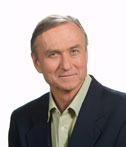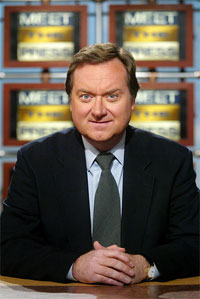A Posthumous Interview by Tim Russert, Former Host of Meet the Press

A Posthumous Interview
by Tim Russert, Former Host of Meet the Press
with John McDougall, MD
McDougall: Thank you for visiting me in my office in Santa Rosa, California under these supernatural circumstances. I am so sorry about your untimely death from a heart attack on June 13, 2008. I read that your end was quick, and hopefully, painless.
I am honored that you requested this interview. You are known for your hard-hitting questions and for demanding truthful and plain-spoken explanations from your guests.

Russert: The reason I am here is I have been gone for more than 2 weeks now, yet doctors, scientists, and the media, all seem baffled about the cause of my death. I have listened to the evening news and talk shows, read the newspapers and weekly magazines, and searched the Internet—but why my life was suddenly taken in my professional prime, at age 58, remains unanswered. In fact, my colleagues, who are the some of the best investigative reporters in the world, aren’t even asking the right questions – so here I am.
I picked you to talk to, Dr. McDougall, because you are known as a ‘no nonsense doctor,’ who speaks the truth regardless of the economic consequences. In fact in the media business you are considered politically incorrect, and occasionally referred to as abrupt, and difficult, but always honest.
McDougall: Well, thank you, I guess, for those words. So how’s ‘life’ in Heaven?
Russert: Not bad except the food’s terrible. Nothing but rice, potatoes, beans, corn, fruits and vegetables. Everything’s bland, but they say I’ll get used to it.
When I was alive I loved to eat. As a child I ate hearty: the butcher, I recall, had a display case that perfectly evoked Buffalo’s (New York) version of multiculturalism and good health, full of pork neck bone, smoked pork neck bone, jellied tongue, Polish bacon, slab bacon, double smoked hunter bacon, German-style wieners, Italian sausage, pork roll sausage, hot or mild beef sausage, barley sausage, beer sausage, double smoked hunter bacon . . . chopped ham, smoked hocks, turkey gizzards, smoked turkey parts, chicken feet, chicken liver, chicken fat, fresh ox tails, and ribs of every type. Boy did I like to eat at those tailgates. I used to fly in wings, Buffalo wings, from Frank and Teresa’s in Buffalo because people in Boston couldn’t do a good wing.
I miss my diet coke and licorice, ‘the breakfast of champions.’ It was my secret for staying up all night and alert.
McDougall: And you say no one has figured out why you died of a heart attack? One look in the mirror should have given you a clue there was something wrong with your diet and you were at risk. For centuries feasting like a king and a queen has caused people to become rotund and sick—why would you be any different?
Russert: My doctors did mention I should eat better, but they never were specific about what to eat. Mostly, they focused on overworking myself. Even if I ate better, don’t you think all that stress I was under would have killed me?
McDougall: Stress is largely used as a scapegoat. It is non-tangible—so obscure that no one has the ability to change it, so it can be easily dismissed. Besides, you loved every minute of your challenging job. Take that excitement away from you and your life would have not been worth living. Stress, in itself, is not a toxin to the body. It is a normal natural part of life. It is a motivator to cause us to get things done and problems resolved. The major way that stress hurt you was by causing you to eat more fried chicken wings.
Consider that in times of unthinkable mental and emotional strain; like during the occupation of Western Europe by the Germans throughout World War II, people became healthier—heart disease and overweight (two of your most notable problems)—essentially disappeared. People during these war years were being incarcerated, killed, and displaced from their homes and families, yet at the same time common diseases were vanishing. The reason for all this improved health was the forced change in their foods—the butter, cheese, and meat were no longer readily available during the war years in Western Europe. People had to eat vegetables.
Russert: I had no chest pains, no previous symptoms of heart trouble. I thought I was healthy. How could such a catastrophe happen so suddenly to me without any warning?
McDougall: A tiny plaque ruptured in an artery, your left anterior descending coronary artery. That is the one that supplied the front of your heart. Think of this plaque as a ‘festering sore,’ or as an inflamed ‘pimple’ filled with fat, cholesterol, and white blood cells. When a plaque ruptures, ‘products of injury’ are released. The response to injury that follows causes the blood flowing inside the artery to suddenly clot—just like when you cut your finger, a clot forms around that injury. In your case the blood clot completely plugged your artery lumen, the blockage suffocating the heart muscle it had once supplied. As the muscle died your heart became an ineffective pump and you died. According to your autopsy report, your entire blood vessel system was in serious trouble—filled with atherosclerosis containing probably thousands of tiny volatile plaques. You were a walking time bomb.
Pharmaceutical companies, like the makers of the blood-thinning drug Plavix, have produced animated videos for the consumer that show this plaque rupture and clot formation. Youtube also has a shocking animation of this event.
Knowing about volatile plaque rupture and clot formation is essential to understanding how your diet caused your death, why the drugs did not save you, and why more aggressive treatment with heart surgery would have been unwise and unhelpful. So take some time to look at these animations.
The reason you had no warning was because there are no pain-sensing nerves in the arteries—thus, there was no feeling from the festering sores invading these tissues. This is a completely silent disease. However, the heart muscle has nerves and when it is injured the pain is often described as an elephant sitting on your chest. I hope you didn’t feel that kind of pain in your final minutes.
Russert: I ate a well-balanced diet. I ate no worse than a lot of people. I don’t understand. Why me?
McDougall: You ate the American diet, and these days most Americans over the age of thirty have outward signs of illness—they are overweight, on medication, and/or have elevated risk factors for future illness. Why you? You were not singled out—1.2 million other Americans also have heart attacks annually, and half of them, like you, never realized they had a problem beforehand. Furthermore, half of heart attack victims die within a few hours—this is not a forgiving disease. Based on what you told me, it appears you ate meat, and other rich foods, with extraordinary enthusiasm.
Your sick arteries were caused by malnutrition. A deficiency of proper nutrients from plants weakened your arteries. Your diet was almost devoid of vegetables and fruits. At the same time, toxic substances, like oxidized cholesterol and saturated fat, from all the animal foods you ate damaged your arteries. Think of pouring corrosive acid on your inner artery surfaces at breakfast, lunch and dinner. The result: thousands of volatile plaques, as small as the size of a pinhead; yet the explosion of just one of them took down a giant of a man like you, Mr. Russert.
Russert: But my doctors said I was a medical success: my blood pressure and cholesterol were well controlled for more than 20 years with medication. My last blood pressure was normal at 120/80 mmHg. My total and ‘bad’ LDL cholesterol and C-reactive protein were all normal. I was near perfect—on paper!
McDougall: People (even doctors) falsely believe that the elevated blood pressure and cholesterol are damaging the arteries and the total solution is to knock these numbers down with drugs. In plain-spoken truth, these elevated numbers are not the problem. No one dies of high blood pressure or cholesterol. These were ‘signs’ pointing to the real problem—your rotten arteries filled with festering sores. But no one was paying enough attention to your underlying disease, as was so clearly demonstrated by your fatal outcome, Mr. Russert. Millions of ‘well-treated’ Americans suffer a fate similar to yours, and we accept this as ‘the best medicine can offer.’
Doctors and drug companies treat signs of disease, the blood pressure and cholesterol numbers, also known as risk factors, with highly profitable medications, because they can—they do sell expensive pills that reduce these signs. They do not treat the underlying sickness, because they can’t—the only way to fix those rotten arteries is by correcting the malnutrition with a diet based on whole starches, vegetables, and fruits.
Russert: Many doctors now say, after I’m dead, that I should have been treated more aggressively, like with heart surgery? But I had a negative stress test April 29, one and a half months before I died.
McDougall: ‘More treatment’ seems to be the answer given for every medical problem; even when those very same treatments kill the patient. The families feel: ‘The doctors did everything possible—my loved one got every surgery and pill they could possibly prescribe.’ The doctors talk of ‘sound medical care.’
Medical experts who have suggested that you should have had an angiogram followed by angioplasty, and/or bypass surgery before you died are ignoring the dismal scientific records for these treatments. Angioplasty has never been shown to save lives and the benefits from bypass surgery are only slightly better, maybe. The reason for this failure is obvious to you now that you understand the underlying cause of your heart attack—the tiny volatile plaques—the festering pustules—the pimples on the verge of popping. These killers are so small you cannot even see them with an angiogram, much less eliminate their threat with a localized surgery.
The angiograms show shadows of large bulges inside the arteries. These are the old, large, fibrous, calcified plaques—disease that is as stable as a rock. These bulges do not rupture, they do not cause a blood clot to suddenly form inside the artery, and they do not cause a heart attack. They are non-lethal. But because of their visible prominence they do lend themselves to surgery. So why do cardiologists and surgeons operate on this stable disease? Because they can. Why do they not fix the pinhead-size killing pustules? Because they can’t. At least they can’t with drugs and surgery. But they could, if they seriously considered their patients’ diets.
A stress test will only detect very large blockages—maybe after a hard, fibrous plaque narrows 70% of the artery. Based on your recent negative results, you had none of these big ones. Now you understand—this test is too insensitive to identify the tiny potentially lethal pustules lining your arteries. The stress test provided you and your family with false reassurance. I hope you didn’t have a celebration feast after hearing the results.
Russert: I exercised 40 minutes a day on my stationary bike. Why didn’t that save me?
McDougall: Exercise does not heal the inner-artery festering sores caused by your meat-centered diet. Exercise can aid in developing a trim muscular appearance and has some health benefits, but it has been over-rated when it comes to warding off premature death. People have said exercise is such a powerful preventative that if you ran a marathon race you would be immune from heart disease. Jim Fixx, author of The Complete Book of Running and the person credited with helping start America’s fitness revolution died at age 52 from a heart attack after his daily run. Cemeteries are filled with young men and women who put too much faith in exercise—ignoring the prevailing role of food.
Russert: Could I have been saved?
McDougall: I believe so. Even as late as a week before you died, you could have avoided this tragedy if you had made a serious change in your diet. Within hours your volatile plaques would have begun to quiet down, reducing their tendency to rupture. As soon as you had eliminated the animal (saturated) fat from your diet your blood would have ‘thinned.’ Then, even if a plaque had ruptured, the risk of forming an occluding clot would have greatly diminished. Saturated fat makes the blood platelets sticky and the blood-clotting proteins very active—all leading to the easy production of a deadly blood clot. Over the following weeks and months of healthful eating your diseased arteries would have healed, with some measurable reversal of the gross plaque. With the same diet you would have lost weight, and lowered your risk factors. Likely, I would have recommended you stop your blood pressure medication immediately; and overtime, reduce and eliminate your cholesterol-lowering statin.
With this simple change you would have regained your lost health and appearance. But the determining factor was not whether a healthy diet would have saved your life over the short and long run. The question is: even if you had known better, would you have changed?
Russert: I would have eaten cardboard to be alive and with my wife and son. I looked forward to every Sunday to my show ‘Meet the Press,’ and the upcoming presidential election. I loved life!
McDougall: That’s what everybody says—after an event. But change is difficult and we have a natural tendency to feel invincible. Sometimes a life-threatening event will wake people up. Unfortunately, you were not given a second chance. If instead, you had suffered a non-fatal heart attack on Friday, June 13, I believe, as one of the world’s top investigative journalists, you would have tracked down that killer.
What amazes me is that over the past two weeks none of your colleagues have asked the tough questions and demanded truthful and plain-spoken explanations from doctors and scientists. The published scientific research is clear about the cause of your death. Your best friend, Tom Brokaw, could solve this crime in an afternoon by reading this research at the local medical library.
But then the hard part would be writing an unpopular story about how the food everybody loves to eat is killing them, and how the quick-fix medications and surgeries don’t really work that well. I’m certain the food and pharmaceutical sponsors of newspapers, magazines, and evening news programs would not be pleased with these truths either.
If you still have any influence on current events on earth, please get the media to do their job and seriously investigate the diet that killed you, and how modern medicine failed you, so that others can have a chance to avoid a similar fate. If any good could come of your untimely death, it would be that people learn the truth—after all, isn’t that the duty of responsible journalists, like yourself?
Recommended Articles

The Truth About Starch (Anti Wheat Belly & Grain Brain)

The Role of a Starch-based Diet in Solving Existential Challenges for the 21st Century






Join the Conversation!
Have a question, a helpful tip, or a story from your journey? Add it below - your voice matters.